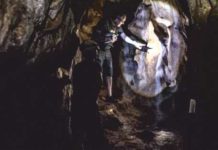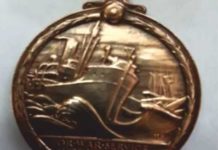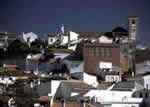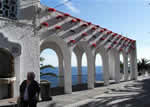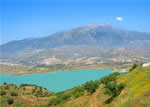
Spain has a long,colourful and diverse history, full of wonderful stories and flamboyant characters. All of us probably know about El Cid, Christopher Columbus (who was Italian) and Don Quixote (who was fictitious). Perhaps we have also heard of Ferdinand and Isabella, who transformed Spain from a fragmented group of states into a powerful and ambitious nation. It was these dual monarchs who employed Columbus to go west and seek a new passage to the east. And everyone, I am sure, have some knowledge of General Franco. Personalities who have shaped Spain into the modern state we know today. But Spain’s history is not only about characters, it is also about events. The struggle against the Moors, the Counter-Reformation, the exploration of the New World, the Peninsula War. So much to tell, so much to know. But how many of us know about of one of the earliest and most important periods, one that was to become the focus of a struggle for power between two of the greatest civilisations the world has ever known – that of Rome and Carthage in the Punic Wars, fought two hundred years before the birth of Christ.
It is the Second Punic War that is the most famous, notable because one of the main protagonists was a man who very nearly brought Rome to its knees – Hannibal Barca. Hannibal, as is famously told, was the man who crossed the Alps on elephants, a feat that was thought to have been impossible to accomplish. Not only did Hannibal succeed, which was unbelievable in itself, he had also formed an army of formidable prowess from the disparate tribes of Spain, Africa and Southern Europe. Imagine, if you would, what a huge undertaking this all was! All those various languages and customs brought together under one banner, one compelling reason to follow Hannibal on his audacious mission – hatred of Rome. The logistics are just mind boggling! But he succeeded, and what is more, he led this army of a thousand different tongues against the might of Rome and destroyed them in battle after battle. In 216 BC Rome suffered its most terrible and complete defeat at Cannae in northern Italy. Here the Carthaginian force under Hannibal annihilated the consular armies of the Roman Republic. The losses sustained by the Romans were greater than those suffered by the British army on that awful first day of the Somme in 1916, a fact which underlines the immensity of the defeat. And on that day, serving with the Roman cavalry, was a young eighteen year old who witnessed the destruction of the Romans and his own father’s death. It was he who persuaded the Roman Senate to invade Spain and take the offensive to the Carthaginians. He was probably one of the greatest generals the world has ever known, perhaps only bettered by Alexander the Great. His name was Publius Cornelius Scipio, known to history as Scipio ‘Africanus’, and it was thanks to him that Rome prevailed and became the most dominant force in the Mediterranean for the next seven hundred years.
As the Carthaginians came ever nearer, Rome was too consumed with fears for its own survival to consider anything else but the destruction of Hannibal himself. Any ideas that vital troops should be diverted to fight in Spain were thought of as being insane. Spain became something of aside show and no serious consideration was given to it until 211 when two Roman armies were destroyed there. Suddenly it became very clear, to even the most narrow-minded, that if Carthage controlled the Peninsula then it could send reinforcements to Hannibal unmolested. The future of Rome looked very bleak indeed.
Powerful voices grew more clamorous for something to be done. If Hannibal could not be defeated in Italy, then at the very least he had to be contained. In the meantime, his supply route was to be strangled. This meant that the subjugation of Spain had to become a priority. The problem lay in finding a suitable commander to lead this expedition, a commander sufficiently experienced or talented enough to be able to crush the armies of Mago and Hasdrubal, the two commanders who had defeated the Romans in 211.. Elections for a proconsul were called, but nobody came forward. The feeling of consternation grew as it became clear that nobody amongst the leading citizens was prepared to take on the Spanish command. In the space of thirty days two of Rome’s most respected generals had been trapped and butchered, together with their troops (see below). It was little wonder, then, that no one was prepared to take over the command in such precarious circumstances. Everyone was arrayed on the Campus, the area set aside for such elections, and the air was thick with the murmurings of discontentment and fear. If panic had not yet set in, it was about to. Desperate times had come, and Rome was in need of salvation. Scipio ‘Africanus’ was this salvation. His speech to the assembly was rousing and patriotic and even his most ardent of critics had to confess that he definitely had that special ‘something’ that moved those who listened to devote themselves to the cause he promoted – the invasion of Spain.
Thirty ships transported Scipio and his army of 10,000 men across the Gallic gulf towards the Greek colony of Emporiae , one of the many Greek cities that remained loyal to Rome and helped it maintain control over the western Mediterranean. During the crossing, Scipio busied himself with the details of the situation in the Spanish Peninsula. It was this attention to detail that was to be the hallmark of his command. Already he had an unerring sense of the importance of strategy and how this could be developed with the proper use of intelligence. He knew that the Carthaginian forces had become separated and dispersed south of the River Ebro and that many former allies had turned against them. The time seemed ripe for a Roman counter-attack. By careful manipulation of these disaffected Spanish tribes he may just be able to tip the balance, but only if he could keep the three Carthaginian armies that marched across Spain apart. He knew that his forces were simply not yet strong enough, or indeed experienced enough, to meet the Carthaginians in open battle. What he needed was time, of which he had little of because news of his landing was certain to reach Hasdrubal and Mago very quickly. He also needed a plan. And as he was Scipio, that plan had already been formulated.
In the next part, we shall see how Scipio put his plan into operation and how he used Spanish weaponry to transform his army into a formidable fighting force.




